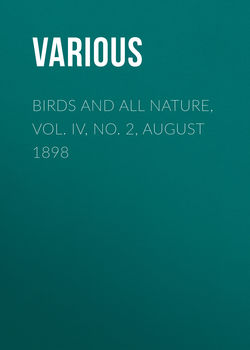Birds and all Nature, Vol. IV, No. 2, August 1898

Реклама. ООО «ЛитРес», ИНН: 7719571260.
Оглавление
Various. Birds and all Nature, Vol. IV, No. 2, August 1898
NATURE'S ADJUSTMENTS
REASONING POWERS OF BIRDS
THE SQUIRREL'S ROAD
THE COMMON TERN
BIRDS AND ANIMALS IN THE PHILIPPINES
BIRDS MENTIONED IN THE BIBLE
THE PRAIRIE WOLF
A HOUSEHOLD PET
THE FOX-SQUIRREL
THE LOON
THE MOCKINGBIRD
THE BOBOLINK'S SONG
HOW BUTTERFLIES ARE PROTECTED
MID-SUMMER
THE RED FOX
THE LEAST SANDPIPER
INSTINCT AND REASON
THE MOUNTAIN SHEEP
A SEMINARY FOR TEACHING BIRDS HOW TO SING
Отрывок из книги
THERE is something very remarkable in the almost reasoning powers manifested occasionally by birds in eluding pursuit or in turning attention from their nests and young, but in few is this more noticeable than in the Duck tribes. In Capt. Black's narrative of his Arctic land expedition the following instance of this is given:
"One of his companions, Mr. King, having shot a female Duck, fired again, and, as he thought, disabled its male companion. Accordingly, leaving the dead bird, which he had the mortification of seeing shortly afterward carried off by one of the white-headed Eagles, he waded into the water after the drake, which, far from being fluttered or alarmed, remained motionless, as if waiting to be taken up. Still, as he neared it, it glided easily away through innumerable little nooks and windings. Several times he reached out his hand to seize it, and having at last with great patience managed to coop it up in a corner, from which there appeared to be no escape, he was triumphantly bending down to take it, when, to his utter astonishment, it looked around at him, cried 'Quack!' and then flew away so strongly that he was convinced he had never hit it at all. The bird's object clearly was to draw the gunner away from its companion."
.....
"One of his companions, Mr. King, having shot a female Duck, fired again, and, as he thought, disabled its male companion. Accordingly, leaving the dead bird, which he had the mortification of seeing shortly afterward carried off by one of the white-headed Eagles, he waded into the water after the drake, which, far from being fluttered or alarmed, remained motionless, as if waiting to be taken up. Still, as he neared it, it glided easily away through innumerable little nooks and windings. Several times he reached out his hand to seize it, and having at last with great patience managed to coop it up in a corner, from which there appeared to be no escape, he was triumphantly bending down to take it, when, to his utter astonishment, it looked around at him, cried 'Quack!' and then flew away so strongly that he was convinced he had never hit it at all. The bird's object clearly was to draw the gunner away from its companion."
This Tern enjoys a large assortment of names: Sea Swallow, Wilson's Tern, Red Shank, Mackerel Gull, and Summer Gull, are a few of them by which it is known in various localities. In several places on the Atlantic coast it breeds in company with other species, such as Forster's, Arctic, and Roseate Terns, the Laughing Gull, and others. Here they breed by thousands, fairly filling the air when disturbed. They place their nests all over the land above high water line, on the beach, on the sides of the bluffs, and even in the garden cultivated by the lighthouse keeper. At Gull Island fresh eggs can be obtained from the 10th of June to the middle of July, as egging parties keep them cleaned off about as fast as they are laid. Public opinion is rapidly coming to the rescue of these beautiful birds, and we may reasonably hope that they may not be wholly exterminated. In connection with this article, we call the reader's attention to Vol. I, pages 103-104, where the Black Tern is depicted and described.
.....